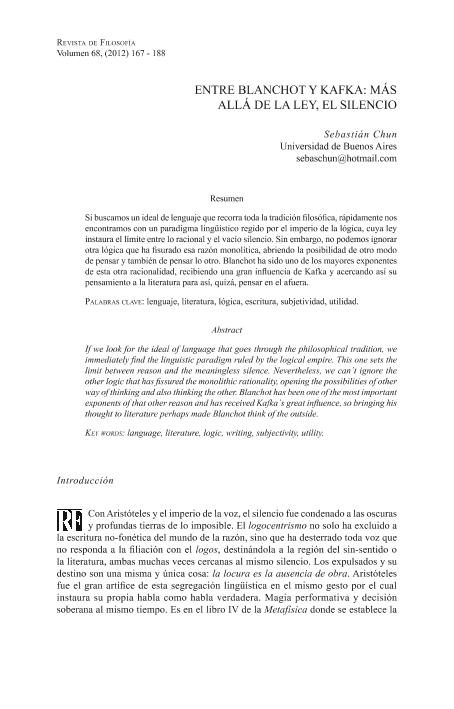Artículo
Si buscamos un ideal de lenguaje que recorra toda la tradición filosófica, rápidamente nos encontramos con un paradigma lingüístico regido por el imperio de la lógica, cuya ley instaura el límite entre lo racional y el vacío silencio. Sin embargo, no podemos ignorar otra lógica que ha fisurado esa razón monolítica, abriendo la posibilidad de otro modo de pensar y también de pensar lo otro. Blanchot ha sido uno de los mayores exponentes de esta otra racionalidad, recibiendo una gran influencia de Kafka y acercando así su pensamiento a la literatura para así, quizá, pensar en el afuera. f we look for the ideal of language that goes through the philosophical tradition, we immediately find the linguistic paradigm ruled by the logical empire. This one sets the limit between reason and the meaningless silence. Nevertheless, we can´t ignore the other logic that has fissured the monolithic rationality, opening the possibilities of other way of thinking and also thinking the other. Blanchot has been one of the most important exponents of that other reason and has received Kafka´s great influence, so bringing his thought to literature perhaps made Blanchot think of the outside.
Entre Blanchot y Kafka: más allá de la ley, el silencio
Fecha de publicación:
05/2012
Editorial:
Universidad de Chile. Facultad de Filosofía y Humanidades
Revista:
Revista de Filosofía
ISSN:
0034-8236
Idioma:
Español
Tipo de recurso:
Artículo publicado
Clasificación temática:
Resumen
Palabras clave:
LENGUAJE
,
LITERATURA
,
LÓGICA
,
ESCRITURA
Archivos asociados
Licencia
Identificadores
Colecciones
Articulos(SEDE CENTRAL)
Articulos de SEDE CENTRAL
Articulos de SEDE CENTRAL
Citación
Chun, Sebastián; Entre Blanchot y Kafka: más allá de la ley, el silencio; Universidad de Chile. Facultad de Filosofía y Humanidades; Revista de Filosofía; 68; 5-2012; 167-188
Compartir




